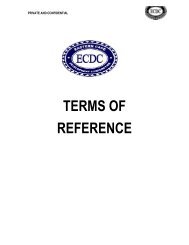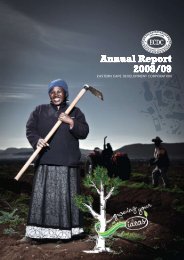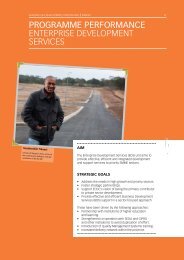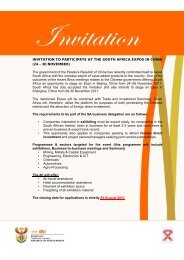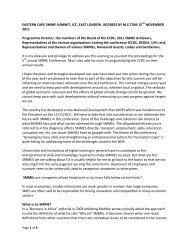2007 / 2008 Annual Report - Eastern Cape Development Corporation
2007 / 2008 Annual Report - Eastern Cape Development Corporation
2007 / 2008 Annual Report - Eastern Cape Development Corporation
- No tags were found...
You also want an ePaper? Increase the reach of your titles
YUMPU automatically turns print PDFs into web optimized ePapers that Google loves.
EASTERN CAPE DEVELOPMENT CORPORATION <strong>2007</strong>/08CONSOLIDATED ANNUAL FINANCIAL STATEMENTSFOR THE YEAR ENDED 31 MARCH <strong>2008</strong>ACCOUNTING POLICIES1 Presentation of Consolidated <strong>Annual</strong> Financial StatementsThe consolidated annual financial statements of the <strong>Eastern</strong> <strong>Cape</strong> <strong>Development</strong> <strong>Corporation</strong> have been prepared inaccordance with South African Statements of Generally Accepted Accounting Practice and in the manner required bythe Public Finance Management Act (Act No. 1 of 1999, as amended) and the <strong>Eastern</strong> <strong>Cape</strong> <strong>Development</strong> <strong>Corporation</strong>Act. The consolidated annual financial statements have been prepared on the historical cost basis as modified bythe revaluations of certain land and buildings, investment properties, available for sale financial assets and financialassets and financial liabilities (including derivative instruments) at fair value through profit or loss.The preparation of annual financial statements in conformity with South African Statements of Generally AcceptedAccounting Practice requires the use of certain critical accounting estimates. It also requires management to exercise itsjudgment in the process of applying the group’s accounting policies. The areas involving a higher degree of judgmentor complexity, or areas where assumptions and estimates are significant to the consolidated financial statements aredisclosed in note 1.16. The annual financial statements have been prepared in the <strong>Corporation</strong>'s functional currency,the South African Rand. These accounting policies are consistent with the previous period.1.1 Underlying assumptionsThe financial statements are prepared on the going concern basis, which assumes that the <strong>Corporation</strong> will continuein operation for the foreseeable future. The financial statements are prepared using accrual accounting whereby theeffects of transactions and other events are recognised when they occur rather than when the cash is received or paid.Assets and liabilities and income and expenses are not offset unless specifically permitted by an accounting standard.Financial assets and financial liabilities are offset and the net amount reported only when a current legally enforceableright to set off the amounts exists and the intention is either to settle on a net basis or to realise the asset and settle theliability simultaneously.Changes in accounting policies are accounted for in accordance with the transitional provisions in the applicablestandard. If no such guidance is given, they are applied retrospectively unless it is impracticable to do so, in which casethe change is applied prospectively. Changes in accounting estimates are recognised in profit or loss in the period theyoccur. Prior period errors are retrospectively restated unless it is impracticable to do so, in which case they are appliedprospectively.Recognition of Assets and LiabilitiesAn asset, being a resource controlled by the entity as a result of a past event from which future economic benefits areexpected to flow, is recognised when it is probable that the future economic benefits associated with it will flow to theGroup and its cost or fair value can be measured reliably. A liability, being a present obligation of the Group arising froma past event the settlement of which is expected to result in an outflow of resources embodying economic resourcesfrom the Group, is recognised when it is probable that future economic benefits associated with it will flow from theGroup and its cost or fair value can be measured reliably.Derecognition of assets and liabilitiesFinancial assets or parts thereof are derecognised, i.e. removed from the balance sheet, when the contractual rights toreceive the cash flows have been transferred or have expired or if substantially all the risks and rewards of ownershiphave passed. Where substantially all the risks and rewards of ownership have not been transferred or retained, thefinancial assets are derecognised if they are no longer controlled by the Group. However, if control is retained, financialassets are recognised only to the extent of the Group's continuing involvement in those assets.All other assets are derecognised on disposal or when no future economic benefits are expected to flow to theGroup from their use or disposal. Financial liabilities are derecognised when the relevant obligation has either beendischarged or cancelled or has expired.Post-balance sheet eventsRecognised amounts in the financial statements are adjusted to reflect events arising after the balance sheet datethat provide evidence of conditions that existed at the balance sheet date. Events after the balance sheet date that areindicative of conditions that arose after the balance sheet date are dealt with by way of a note.75



